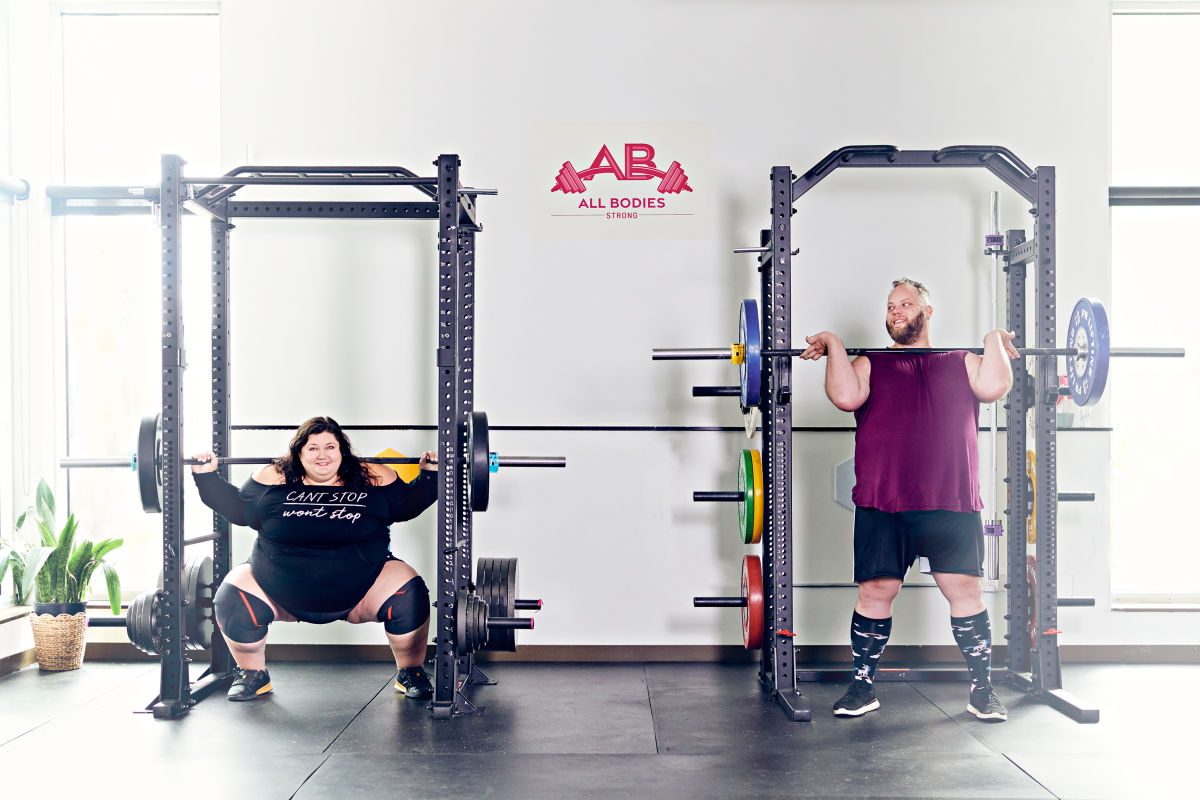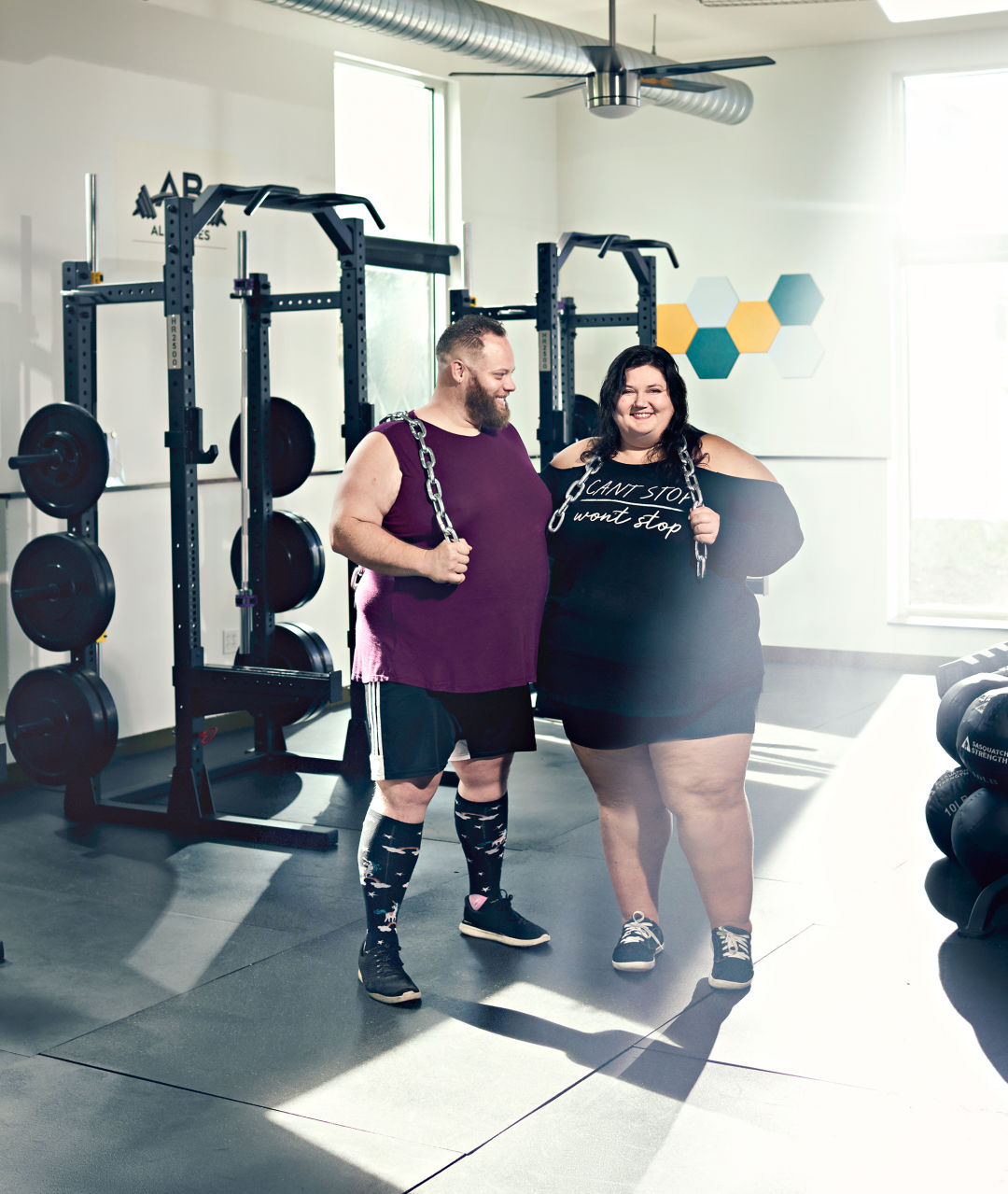Where Are Portland’s Size-Inclusive Gyms?

Christina Malone and Will Lay founded their fat-positive gym, All Bodies Strong, in 2023.
As lifelong athletes and competitive powerlifters, couple Christina Malone, 38, and Will Lay, 44, log countless gym hours. But as plus-size athletes, they’ve seldom found a space designed for their bodies. Physically, machine weight capacities are often too low for them to use safely, and seats aren’t wide or deep enough. Psychologically, gym culture is mercilessly prejudiced against their bodies, which don’t fit clichéd fitness standards. Inundated with messages—subtle or otherwise—that their bodies were unwelcome, they developed body dysmorphia, exercise addiction, and disordered eating. While on a run a few years ago, her feet pushed to the point of bleeding, Malone decided she’d had enough. “I didn’t want to live the rest of my life trying to shrink,” she told me, “just so I could fit someone else’s vision.”
That day, she booked her first session with the only body-positive trainer she could find. Lay soon followed, and together they started on a path that eventually led to opening their own size-inclusive gym, All Bodies Strong, last fall. Instead of promoting weight loss, their personal training, powerlifting, boxing, and yoga classes center movement, strength-gaining, and fun. It’s the only gym of its kind they know of in town.
Malone and Lay are proponents of the larger fat liberation movement, both for their members and on a broader, societal scale. Everything from restaurant seats to office chairs, medical equipment to emergency contraceptive pills, is designed for smaller bodies, making many unavoidable parts of daily life inaccessible, and often painful, for fat people. Fitness is a particular sticking point, because previously accepted science paints fat-positive exercise as an oxymoron. However, more recent medical thinking is skeptical of weight as a direct indicator of health. Many people in bigger bodies may exercise frequently without losing weight. The benefits of working out stretch far past weight loss: exercise reduces the risk of heart disease and improves cognition, and its endorphin rush can counteract anxiety and depression. All Bodies Strong, then, offers an alternative to the modern gym and celebrates the other joys of working out.
Portland’s plus-size community is well-established. Fat activist and author Aubrey Gordon, who cohosts the popular podcast Maintenance Phase, lives in the area, as does Renée Watson, the New York Times bestselling author whose stories often tackle the prejudicial struggles of both race and size. The Hulu show Shrill, an adaptation of Lindy West’s essay collection exploring her identity as a fat woman in the Pacific Northwest, was shot and set in Portland. And the city is home to several fat-friendly community spaces and organizations, places like plus-size resale clothing store I Want Seconds, and projects like OHSU’s Fat Justice Working Group, which fights anti-fat bias and weight stigma in health care. Chub Hub PDX hosts and sponsors body diverse events like comedy shows, shopping crawls, and a summer body positivity block party, where All Bodies Strong had a booth in August.

The couple designed their space and training programs to accommodate people in larger bodies.
Still, we’re lacking in gyms. While fitness centers across Portland advertise body diversity, Malone and Lay say it’s rare for a gym to prioritize size inclusion. Which is why they built their own.
Upon entering, it’s impossible to ignore All Bodies Strong’s generous use of space. Powerlifting cages, leg press and extension machines, and a central cable machine are given noticeable clearance. On average, each weight lifter has 200–300 square feet to themselves, four to six times the industry average. The equipment has expanded seat widths and highly adjustable components to accommodate a range of body sizes, reinforced to support bodies weighing up to 500 pounds. They use “open-style trap bars,” Lay explains, which are a shallow U shape, instead of the traditionally closed, hexagonal bar shape that wraps around a lifter’s body when in use, and thus only works for a certain sized body. Plyometric or “jump” boxes, cubes to hop on and off, are often unstable for people in larger bodies. So All Bodies Strong uses a more stable, wooden model lined with high-density foam.
Beyond the equipment, All Bodies Strong uses its space for body-diverse community building. A calendar hanging next to the yoga and boxing classroom is loaded with events Malone and Lay organize or sponsor, including a recent plus-size drag competition and a pool party. LGBTQ+ flags and fat artists’ work hang on the walls next to a “Win Board” dedicated to celebrating achievements unrelated to weight loss, like increasing your bench press max.
Practically, as personal trainers, Lay and Malone know how bigger bodies move, and can modify exercises to better suit them. But in their perspective, the emotional support they offer is just as vital. They share first-hand experiences with clients and supplant “theories of goodness or badness around size,” which, Malone and Lay can attest, are extremely damaging.
Kimberly Sidorowicz, who’s been training at the gym since January, says she’s increased her mobility, rebuilt strength, and developed stamina, but the ideological benefits have made the largest impact. “It truly ignited a love for myself and an appreciation for my body,” she says. “I had never experienced that.”
“In other gyms my body is viewed as a problem that needs to transform, i.e., shrink,” another client, Erin Headley, says. For Headley, the principal here is that “no one’s body is a problem.”
Malone feels she has built the community she couldn’t find for herself just a year ago, which has been incredibly gratifying. Instead of offering an alternative vision of what success in the gym looks like, she and Lay are offering the tools to find what that means for each person. “People come in and change their own lives,” Malone says.
Related
Yaslen Clemente Shows Off Leg Day Gains and Shares Her…
Yaslen Clemente isn't just an influencer—she's a fitness powerhouse. The social media star is known for her intense workouts, and she recently sha
Samantha Espineira Stuns in Blue Swimsuit and Shares Her 5…
Samantha Espineira knows how to turn heads, both on and off the runway. The successful model and Instagram influencer regularly shares breathtaking
The Best Fitness Trackers To Help You Reach Any Health…
Best Health Tracker: Oura Ring 3Why We Love It: I’ve tried many, many fitness trackers—but I tend not to stick with one watch or band for very long. I’ve
#CycleSyncing debunked: Popular TikTok trend not backed by science
A new study has debunked a popular TikTok wellness trend called cycle syncing, which claims that tailoring a workout routine to match the hormonal changes that












